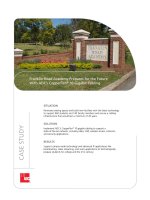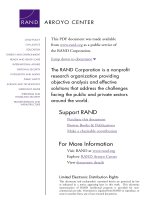Deutsche bank building for the future annual review 2013 passion to perform
Bạn đang xem bản rút gọn của tài liệu. Xem và tải ngay bản đầy đủ của tài liệu tại đây (10.18 MB, 572 trang )
Building for
the future
Annual Review 2013
Building for the future
In 2013, Deutsche Bank made solid progress on its Strategy
2015+
targets. The bank became leaner, safer and better balanced.
We successfully cut costs, swiftly reduced balance sheet risks and
strengthened our capital position.
The strength of our core businesses is the basis for our platform
reconguration. All corporate divisions performed well in a dicult
market environment. Increasing protability remains a top priority
at Deutsche Bank – also in the interests of our shareholders.
Our aspiration to become one of the world’s leading universal banks
is ambitious. Since the inception of Strategy
2015+, we have invested
in the implementation of our strategy, dealing with the past and
positioning Deutsche Bank for the future. We are more certain of being
on the right path than ever before. We will hold our course and maintain
our focus on disciplined implementation of Strategy
2015+.
We discussed our annual topic “Building for
the future” with our shareholder Justin Bisseker,
European Banks Analyst, Schroders, London
(pages 16 /17); our clients DeeAnna Staats, Wealth
Management client, Malibu (pages 34 / 35);
Mohammed Sharaf, Group Chief Executive Ocer,
DP World, Dubai (page 43); William B. Tyree,
Partner at Brown Brothers Harriman & Co., New
York (page 47) and Goedele Matthyssen, business
client, Hornow (page 57); our colleague Alex
Marzo, Deutsche Bank, Sociedad Anónima Española,
Barcelona (pages 68 / 69); and Teresita Silva,
Founder and President of ChildHope Philippines
and FCED, Manila (pages 74 / 75).
Deutsche Bank
The Group at a glance 2013 2012
Share price at period end € 34.68 € 32.95
Share price high € 38.73 € 39.51
Share price low € 29.41 € 22.11
Basic earnings per share € 0.67 € 0.28
Diluted earnings per share € 0.65 € 0.27
Average shares outstanding, in m., basic 997 934
Average shares outstanding, in m., diluted 1,025 960
Book value per basic share outstanding € 53.24 € 57.37
Tangible book value per basic share outstanding € 39.69 € 42.26
Pre-tax return on average shareholders’ equity 2.6 % 1.3 %
Pre-tax return on average active equity
1
2.6 % 1.4 %
Post-tax return on average shareholders’ equity 1.2 % 0.5 %
Post-tax return on average active equity 1.2 % 0.5 %
Cost / income ratio 89.0 % 92.5 %
Compensation ratio 38.6 % 40.0 %
Noncompensation ratio 50.3 % 52.5 %
in € m. 2013 2012
Total net revenues 31,915 33,736
Provision for credit losses 2,065 1,721
Total noninterest expenses 28,394 31,201
Income before income taxes 1,456 814
Net income 681 316
in € bn. Dec 31, 2013 Dec 31, 2012
Total assets 1,611 2,022
Total shareholders’ equity 54.7 54.0
Common Equity Tier 1 capital ratio 12.8 % 11.4 %
Tier 1 capital ratio 16.9 % 15.1 %
Number Dec 31, 2013 Dec 31, 2012
Branches 2,907 2,984
thereof in Germany 1,924 1,944
Employees (full-time equivalent) 98,254 98,219
thereof in Germany 46,377 46,308
Long-term rating Dec 31, 2013 Dec 31, 2012
Moody’s Investors Service A2 A2
Standard & Poor’s A A+
Fitch Ratings A+ A +
1
We calculate this adjusted measure of our return on average shareholders’ equity to make it easier to compare us to our competitors. We refer to this
adjusted measure as our “Pre-tax return on average active equity”. However, this is not a measure of performance under IFRS and you should not compare
our ratio based on average active equity to other companies’ ratios without considering the dierences in the calculation of the ratio. The items for which
we adjust the average shareholders’ equity of € 56.1 billion for 2013 and € 55.6 billion for 2012 are average dividends of € 646 million in 2013 and € 670 million
in 2012, for which a proposal is accrued on a quarterly basis and which are paid after the approval by the Annual General Meeting following each year.
Facts /
Figures
The Deutsche Bank Share
Useful information on the Deutsche Bank share
2013
Change in total return
1
7.47 %
Share in equities trading (Xetra)
1
5.86 %
Average daily trading volume
2
6.2 million shares
Share price high
€ 38.73
Share price low
€ 29.41
Dividend per share ( proposed for 2013 )
€ 0.75
As of December 31, 2013
Issued shares
1,019,499,640
Outstanding shares
1,019,327,736
Share capital
2,609,919,078.40
Market capitalization
€ 35.37 billion
Share price
3
€ 34.68
Weighting in the DAX
4.36 %
Weighting in the Euro STOXX 50 1.84 %
Securities identication codes
Deutsche Börse New York Stock Exchange
Type of issue Registered share Type of issue Global Registered Share
Symbol DBK Currency U.S. $
WKN 514000 Symbol DB
ISIN DE0005140008 CINS D 18190898
Reuters DBKGn. DE Bloomberg DBK GR
1
Share price based on Xetra
2
Order book statistics ( Xetra )
3
Xetra closing price
210 mm6,5 mm
Contents
19
CorporateProleandOverview
Aleadingglobaluniversalbank
withaclearstrategy
24
CorporateGovernance
Corporategovernancebasedon
bestpractices
27
Culture
Culturalchange–layingthe
foundationsforourfuturesuccess
29
CreatingValueforOurStakeholders
Shareholders,clients,sta
andsociety
DeutscheBankGroup
1
71
StatementofIncome
72
BalanceSheet
73
GroupFive-YearRecord
ConsolidatedFinancial
Statements/Excerpts
3
37
Shareholders
Successfulcapitalincrease
41
Clients–CorporateBanking&Securities
Ecientuseofresources
forsustainablegrowth
46
Clients–GlobalTransactionBanking
Stableperformanceinallregions
51
Clients–DeutscheAsset
&WealthManagement
Preservingandincreasingwealth
55
Clients–Private&BusinessClients
Astrongleaderintheprivate
clientsbusiness
60
Non-CoreOperationsUnit
Goodprogressmadeinreducingrisk
62
Sta
Diverse,talentedandmotivated
65
Society
Fosteringcorporateresponsibility
Stakeholders
2
77
Glossary
80
Imprint/Publications
FurtherInformation
4
02
InterviewwiththeChairmen
oftheManagementBoard
08
GroupExecutiveCommittee
10
LetterfromtheSupervisoryBoard
14
SupervisoryBoard
»In 2013, Deutsche
Bank made signicant
progress in implementing
Strategy 2015+«
02Deutsche Bank
Annual Review 2013
Interview with the Chairmen of the Management Board
Interview with the Chairmen
of the Management Board
Building for the future
19. March 2014, 7:03 PM19. March 2014, 7:03 PM
03Deutsche Bank
Annual Review 2013
Interview with the Chairmen of the Management Board
What challenges did Deutsche Bank
face in 2013?
Jain: ― DeutscheBank faced a number
of challenges during
2013. The global
economy continued to recover, but
at dierent speeds:
growth in the U.S.
and Asia Pacic was signicantly
stronger than in Europe.
Interest rates
remained very low, as many govern-
ments and central banks around
the world continued to provide stimu-
lus by pumping liquidity into their
economies.
Business volumes in
some businesses were muted, and
many clients remained risk-averse
despite stronger equity markets.
Regulation of the banking industry
continued to tighten with a renewed
focus on leverage and, more recently,
structural reform.
Additionally, the
banking industry was confronted
with signicant litigation costs relat-
ing to issues which arose in past
years.
Against this backdrop, how did
Deutsche Bank perform?
Fitschen: ― Group pre-tax prots for
2013 were up by 79 % to € 1.5 billion,
while the core bank reported pre-tax
prots up
27 % to € 4.8 billion. While
we’re pleased with the year-on-year
improvement, we’re not satised
with this level of protability.
We
have the potential to deliver more for
our shareholders, and Strategy
2015+
is designed to deliver that potential.
Jain: ―
It’s important to consider
the factors that drove these results.
Our reported prots reect the impact
of specic charges related to imple-
menting our strategy: the cost of
derisking in our Non-Core Operations
Unit or
NCOU, investments in our
Operational Excellence Program
( OpEx ) and charges to resolve major
litigation issues.
These eects, along
with some specic accounting ad-
justments, together reduced pre-tax
prots by
€ 7 billion in 2013.
Taking account of these factors, what
about the underlying core business?
Fitschen: ― Adjusted protability in our
core business was close to its stron-
gest ever, at
€ 8.4 billion. We achieved
this with a leaner platform: We re-
duced assets, risk-weighted assets
and costs substantially from their peak
levels. In addition, we improved the
balance between investment banking
€
4.8
billion
pre-tax prots in
the core bank
19. March 2014, 7:03 PM
€
2.1
billion
in cumulative
OpEx savings
04Deutsche Bank
Annual Review 2013
Interview with the Chairmen of the Management Board
and non-investment banking earnings,
thanks to growth in Private and Busi-
ness Clients
( PBC ), Global Transaction
Banking
( GTB ) and Deutsche Asset &
Wealth Management ( DeAWM ).
Together, these non-investment bank-
ing businesses accounted for around
half of our operating protability in
2013. In other words, Deutsche Bank
produced one of its strongest-ever
operating results with a leaner, safer
and better balanced business.
Have you made Deutsche Bank safer?
Jain: ― Yes! In the nancial crisis, banks
got into diculties either from a lack
of liquidity or a lack of capital.
We’ve
strengthened
DB against both. Our
Common Equity Tier
1 capital is now
signicantly higher than early 2012.
In addition we have transformed the
quality of our funding base, which
now consists predominantly of the
most stable sources of funding.
How did DB’s core businesses
perform in 2013?
Fitschen: ― All businesses did well in
challenging conditions.
CB & S deliv-
ered solid protability and good re-
turns despite ongoing restructuring.
While
2013 was a challenging year for
xed income, we saw good momen-
tum in both equities and corporate -
nance, and we’re committed to main-
taining our world-leading investment
banking franchise.
PBC’s operating
prot grew despite ongoing low inter-
est rates, and we made progress on
three major initiatives – integrating
Postbank, building a common operat-
ing platform, Magellan, and launch-
ing a new Mittelstand initiative.
GTB turned in robust operating prot
growth with good cost discipline
despite low interest rates and a chal-
lenging environment in our core
European market.
DeAWM produced
record operating prot with both
revenue growth and cost savings as
we reap the benets of integrating
ve business units into one.
We’re now nearly halfway through
Strategy 2015+ what does the
“scorecard” look like?
Jain: ― We’re making solid progress
on all our key objectives.
We’ve
strengthened our Common Equity
Tier
1 capital ratio from below 6 % in
early
2012 to 9.7 %. During 2013, our
leverage ratio improved from
2.6 % to
3.1 %. In respect of costs, OpEx has
so far delivered savings of
€ 2.1 billion
– that’s half a billion ahead of our
2013 year-end target.
Our core businesses have returned
solid operating protability and
sustained strong customer franchises
while dealing with the twin challenges
of signicant reconguration and a
challenging operating environment.
We have recongured our businesses
more closely around the needs of
our clients, for example by transferring
some 10,000 German Mittelstand
clients to our dedicated private and
commercial banking platform and by
creating an integrated, full-service asset
and wealth management oering.
Fitschen: ― Last but certainly not least:
We laid solid foundations for cultural
change. We launched new values
and beliefs, strengthened our control
environment and put some legacy
litigation matters rmly behind us.
We’re under no illusions. We know
cultural change is a long-term,
multi-year eort; but we are on the
right track.
How is the Operational Excellence
Program meeting its objectives?
Jain: ― OpEx has saved money by buy-
ing smarter, putting the right people
in the right locations and reaping
the benets of a more ecient plat-
form.
For example, we eliminated
19. March 2014, 7:03 PM19. March 2014, 7:03 PM
Cultural
change
is already transforming our
everyday business
05Deutsche Bank
Annual Review 2013
Interview with the Chairmen of the Management Board
1,200 IT applications – over 20 % of
our total – and identied another
1,100
for decommissioning; we cut our
number of vendors by around
18,000
or nearly one in four; and we disposed
of over
60,000 square meters of
oce space.
Fitschen: ― OpEx is also about building
a world-class platform.
We are invest-
ing some
€ 1.4 billion in integrating
business platforms, around
€ 700 mil-
lion to consolidate and standardize
systems, ar
ound
€ 600 million to create
a more eective organization. And
we’re spending a further
€ 200 million
to automate and simplify processes.
What dierence does cultural change
make in everyday practice?
Jain: ― Cultural change is visible in
numerous aspects of our day-to-day
act
ivity.
For example, for our most
senior leaders, we have extended
the vesting period for deferred
compensation awards from three
to ve years with strict clawback
provisions. That aligns rewards with
longer
-term performance more than
short-term gain. In
2014, we will change
the way we assess people for bonus
and promotion, taking into account
our new values and beliefs.
Fitschen:
―
We have also strengthened
our control environment.
We’re in-
vesting around
€ 1 billion until 2015 to
adapt our systems to new regulation
and are hiring more people into our
Compliance function.
We have made
key appointments, including a Chief
Contr
ol Ocer and a Chief Gover-
nance Ocer.
We also launched a
special initiative, reporting directly
to us, to further reinforce our control
model acr
oss businesses, control
functions and Group Audit – our
three lines of defense against control
de
ciencies.
DeutscheBank faces litigation arising
from legacy issues.
What’s the current
status?
Fitschen: ― During 2013, we put two major
legacy issues behind us: the European
Commission’s probe into
IBOR – Inter-
19. March 2014, 7:03 PM
06Deutsche Bank
Annual Review 2013
Interview with the Chairmen of the Management Board
bank Oered Rate – and litigation with
the
FHFA
– Federal Housing Financing
Agency – related to mortgages in the
U.S
. We also recently reached a settle-
ment with the Kirch Group which
ends al
l legal disputes between the
parties in this long-standing and
well-known legacy matter.
In certain
other cases, we successfully contested
litigation
brought against the bank.
In the remainder of
2014 we will con-
tinue our eorts to resolve legacy
litigation issues.
Looking ahead, how do you see
the year
2014?
Jain: ― We see 2014 as another year
of challenges and of disciplined
implementation of Strategy
2015+.
We will make further progress on
reconguring our businesses,
strengthening our infrastructure
‘spine’, and elevating our systems
and controls to best-in-class.
We
anticipate cumulative savings from
OpEx to approach € 3 billion, and
further investments of some
€ 1.5 bil-
lion into OpEx.
In addition, we aim
to build on our momentum in making
decisive progress toward our lever-
age reduction target.
Fitschen: ― In 2014 we must also
respond successfully to new regula-
tions, including the asset quality
review and the stress test imple-
mented by the European Banking
Authority, and the transition to a
single
EU banking regulator.
And what about
2015 and beyond?
Jain: ― We are condent that in 2015
we will see the benets of the
progress we have made so far, and
will continue to make in
2014. We
are extremely grateful for the focus
and discipline of our sta and for
the commitment they have demon-
strated and continue to demonstrate
in implementing our strategy.
Fitschen: ― Completing Strategy 2015+
will leave DeutscheBank well pos-
itioned to capitalize on future long-
term trends.
In the global economy,
we continue to see dynamic growth
2014
we will make further progress
on reconguring our businesses
19. March 2014, 7:03 PM19. March 2014, 7:03 PM
»We aspire to be the
leading client-centric global
universal bank, and we
rearm that vision.«
07Deutsche Bank
Annual Review 2013
Interview with the Chairmen of the Management Board
in the world’s emerging markets.
This favors a small number of banks
with a truly global network, fran-
chise and expertise. DeutscheBank
is one of them. As demographics in
many important markets shift toward
an ageing population, savings and
retirement solutions will become
increasingly important. Here, too, we
have unique advantages as a global,
fully-integrated asset and wealth
manager.
Jain: ― Technology is transforming
the way we reach our clients. More
than ever, they connect with us
through smartphones, laptops
and other mobile devices.
This is
an opportunity we are determined to
grasp.
Our industry is consolidating
in both the
U.S. and Europe, and this
trend will continue. DeutscheBank
is uniquely poised as a consolidator,
particularly in Europe.
So DeutscheBank’s strategic vision
remains unchanged?
Fitschen: ― Absolutely. We have made
signicant progress so far, and we’re
condent that we will build on that
momentum, deliver Strategy
2015+
and position DeutscheBank as a
winner in the post-
2015 environment.
We aspire to be the leading client-
centric global universal bank, and
we rearm that vision.
We stay the
course.
Frankfurt am Main, March 2014
19. March 2014, 7:03 PM
1 2 3
4
7 8
5 6 9
1
Jacques Brand, *1960
Chief Executive Ocer
of North America
2
Alan Cloete, *1962
Co-Chief Executive Ocer
of Asia Pacic
3
Gunit Chadha, *1961
Co-Chief Executive Ocer
of Asia Pacic
4
Colin Grassie, *1961
Chief Executive Ocer of the UK
5
Stuart Lewis, *1965
Management Board member
since 2012.
Chief Risk Ocer
6
Rainer Neske, *1964
Management Board member
since 2009.
Head of Private & Business Clients
7
Robert Rankin, *1963
Co-Head of Corporate Banking &
Securities and Head of Corporate Finance
8
Colin Fan, *1973
Co-Head of Corporate Banking &
Securities and Head of Markets
9
Stefan Krause, *1962
Management Board member since 2008.
Chief Financial Ocer
08Deutsche Bank
Annual Review 2013
Group Executive Committee
Group Executive Committee
19. March 2014, 6:50 PM19. March 2014, 6:50 PM
10 11
12 13 14 17
1615
18
10
Jürgen Fitschen, *1948
Management Board member since 2009.
Co-Chairman of the Management Board
and the Group Executive Committee
11
Anshuman Jain, *1963
Management Board member since 2009.
Co-Chairman of the Management Board
and the Group Executive Committee
12
Michele Faissola, *1968
Head of Deutsche Asset & Wealth
Management
13
Werner Steinmüller, *1954
Head of Global Transaction Banking
14
Christian Ricken, *1966
Chief Operating Ocer
of Private & Business Clients
15
Stephan Leithner, *1966
Management Board member since 2012.
Chief Executive OcerEurope (except
Germany and UK), Human Resources,
Legal, Compliance, Government &
Regulatory Aairs
16
Henry Ritchotte, *1963
Management Board member
since 2012.
Chief Operating Ocer
17
Richard Walker, *1950
General Counsel
18
David Folkerts-Landau, *1949
Chief Economist and
Global Head of Research
5 – 6 – 9 – 10 – 11 – 15 – 16
Members of the Management Board
of DeutscheBankAG.
09
Deutsche Bank
Annual Review 2013
Group Executive Committee
19. March 2014, 6:50 PM
Deutsche Bank
Annual Review 2013
10Letter from the Supervisory Board
Frank Bsirske
Dina Dublon
Stephan Szukalski
Suzanne Labarge
John Cryan
Henriette Mark
Dr. Johannes Teyssen
Bernd Rose
Sabine Irrgang
Peter Löscher
Dr. Paul Achleitner
Alfred Herling
Gabriele Platscher
Katherine Garrett-Cox
Professor Dr. Klaus Rüdiger Trützschler
Rudolf Stockem
Professor Dr. Henning Kagermann
Martina Klee
Timo Heider
Georg F. Thoma
The Supervisory Board
from left to right:
19. March 2014, 6:50 PM19. March 2014, 6:50 PM
11Letter from the Supervisory Board Deutsche Bank
Annual Review 2013
The past year was eventful and ultimately very challenging for your bank.
Independent of the dicult economic conditions in many markets and the
extensive changes taking place within the bank as part of Strategy
2015+,
regulatory and legal issues came to the fore. These had a considerable
impact on the bank both internally and externally.
Consequently, the Supervisory Board’s focus was divided roughly equally
between our supervisory duties and our role as an advisory body. To fulll
our responsibilities, we not only met formally a total of 39 times in
2013,
but we also organized ourselves more eectively. Your Supervisory Board
has at its disposal not only a high level of professional expertise, but also an
expanded committee structure which enables each member to contribute
detailed and focused input.
Integrity Committee: First to mention here is the newly formed Integrity
Committee, which looks closely at legal matters, reputational issues and
general questions relating to social responsibility. It also monitors the
bank’s cultural change process. After it was established in May
2013, the
committee met ve times under the chairmanship of Georg F. Thoma to
discuss complex matters relating to legal and regulatory matters. During
these meetings, it not only discussed specic cases but also considered
their possible consequences for organizational change and future conduct.
We believe, that by forming the Integrity Committee, we have created a
best practice example for addressing environmental, social and governance
(ESG) issues.
Audit Committee: Following his election last May, John Cryan assumed the
chair of the Audit Committee from Dr. Karl-Gerhard Eick. We would like to
take this opportunity to thank Dr. Eick once again for his nine years of service
for Deutsche Bank. The Audit Committee met a total of eleven times in
2013
and analyzed the nancials intensively on each occasion. It examined indi-
vidual balance sheet items and looked at how the bank had dealt with specic
inquiries from regulators. One focal point was how the bank addressed the
issues raised by Group Audit. The appointment of external auditors also
received particular scrutiny in light of the contesting lawsuits. The restructuring
of the Group Audit function and an assessment of the bank’s risk systems
featured prominently on the Audit Committee’s full agenda.
Risk Committee: A clear division of responsibilities between the Integrity
Committee and the Risk Committee, which met six times in
2013, made it
possible for the Risk Committee to focus less on legal risks and more on
market, credit and operational risks. Given the dicult and, at times, very
volatile market environment, this was crucial in
2013. The overlapping
memberships in the Risk, Integrity and Audit Committees ensured close
cooperation between these committees. Other topics discussed intensively
Dear Shareholders,
19. March 2014, 8:32 PM
12Letter from the Supervisory Board Deutsche Bank
Annual Review 2013
included the EU requirements for recovery and resolution plans as well as
the preparations for the upcoming stress tests by the European Banking
Authority and the asset quality review by the European Central Bank.
Compensation Control Committee: Under the
Capital Requirements Directive
IV Implementation Act, Deutsche Bank is required in accordance with
section
25d (12) of the German Banking Act to establish a separate Com-
pensation Control Committee. The role of this committee is not only to
advise the Supervisory Board on Management Board compensation, but
also to support the Supervisory Board in monitoring the appropriateness
of compensation structures for all employees of the bank. In this regard, the
committee’s duties pursuant to the German Banking Act go beyond the
scope of the German Stock Corporation Act’s provisions. To ensure an ecient
start, we established the Compensation Control Committee last year. This
allowed its members to take part in two workshops and engage in private
study to familiarize themselves with the issues at hand. As a result, they
were already able to contribute to reviewing the
2013 compensation round.
Nomination Committee: Although the bank already had a Nomination
Committee, as required by the German Corporate Governance Code, it was
previously tasked with seeking suitable shareholder representatives for
the Supervisory Board and presenting them to the full Supervisory Board
in preparation for the proposal for their election at the General Meeting.
With eect from January 1, 2014, new requirements under the German Banking
Act also apply. Now, the Nomination Committee is required not only to
support the Supervisory Board in selecting shareholder representatives,
but also in appointing Management Board members. Furthermore, it also
has to perform an annual assessment of the Management Board and Super-
visory Board, evaluating both boards in their entirety as well as each
member individually. As is the case with the Compensation Control Com-
mittee, legislators have gone a step further here and require the Nomination
Committee to review the selection criteria for the second management
level. In the light of these expanded duties, representatives of the employees
have also been appointed to the Nomination Committee. The Supervisory
Board will submit a proposal to the Annual General Meeting for the Nom-
ination Committee’s work to be compensated accordingly in the future.
Chairman’s Committee: This committee met eight times in
2013, addressing
general governance issues as well as specic Management Board matters.
Its tasks also included the preparation of our plenary sessions and the strategy
workshop as well as the organizational restructuring of the committees
specied above and their terms of reference. The preparations for the two
General Meetings in
2013 and overseeing the bank’s capital increase also
required our attention. During the year, we also prepared a review of the
eciency of the work of the full Supervisory Board and identied further
potential for improvement, which includes enhanced training programs.
19. March 2014, 8:32 PM19. March 2014, 8:32 PM
13Letter from the Supervisory Board Deutsche Bank
Annual Review 2013
Supervisory Board: In addition to the seven regular plenary sessions, we also
held a two-day strategy workshop in
2013. For the rst time, the Chairmen
of the Management Board also participated in parts of this workshop. The
focus here was on strategy, regulatory issues and succession planning.
Furthermore, we held two-day introductory seminars on bank-specic issues
aimed primarily, but not exclusively, at new members of the Supervisory
Board. These seminars were widely attended, as were external training
courses tailored to individual needs.
In addition to the work in the committees and full Supervisory Board, regular
discussions also take place not only between the Chairman and Deputy
Chairman of the Supervisory Board, but also among the three committee
chairmen and with the Management Board.
We hope that this overview, which is complemented by the more detailed
description in the Report of the Supervisory Board beginning on page
451 of
the Financial Report, demonstrates how seriously we take our responsibilities.
The topics covered in great detail in last year’s letter, especially our under-
standing that we have an obligation and responsibility to you in return for
the trust you place in us, once again served to guide us through challenging
times. We are convinced that Deutsche Bank will succeed in realizing its
full potential to become the leading client-centric universal bank. One of the
main reasons for this optimism lies in the quality of our employees. We thank
them for their tireless work over what has been a very challenging year.
We still have a long way to go to achieve the social and competitive position
you can expect. Improving Deutsche Bank’s reputation, also in the light of
its less than satisfactory net results in
2013, will be essential. But, as the say-
ing goes, even the longest journey begins with a single step. Over the past
year, we already took many steps forward – and our destination is clear.
Thank you for your support!
On behalf of the Supervisory Board,
Dr. Paul Achleitner
Chairman
Frankfurt am Main, March 2014
Alfred Herling
Deputy Chairman
19. March 2014, 8:32 PM
14Deutsche Bank
Annual Review 2013
Supervisory Board
* Elected by the employees in Germany; Renate Voigt appointed
by the court as employee representative.
Supervisory Board
Dr. Paul Achleitner
Chairman
Munich
Alfred Herling *
since May 23, 2013
Deputy Chairman
Deutsche Bank AG,
Wuppertal
Karin Ruck *
Deputy Chairperson
until May 23, 2013
Deutsche Bank AG,
Bad Soden am Taunus
Wolfgang Böhr *
until May 23, 2013
Deutsche Bank AG,
Dusseldorf
Frank Bsirske *
since May 23, 2013
Chairman of ver.di –
Vereinte Dienstleistungsgewerkschaft,
Berlin
John Cryan
since May 23, 2013
President Europe, Head Africa,
Head Portfolio Strategy,
Head Credit Portfolio
Temasek International Pte Ltd.,
Singapore
Dina Dublon
since November 1, 2013
New York
Dr. Karl-Gerhard Eick
until May 23, 2013
KGE Asset Management Consulting Ltd.,
London
Katherine Garrett-Cox
Chief Executive Ocer of
Alliance Trust Plc,
Brechin, Angus
Timo Heider *
since May 23, 2013
BHW Bausparkasse Zentrale,
Emmenthal
Sabine Irrgang *
since May 23, 2013
Deutsche Bank AG,
Mannheim
Prof. Dr. Henning Kagermann
President of acatech – German
Academy of Science and Engineering,
Königs Wusterhausen
Martina Klee *
Deutsche Bank AG,
Frankfurt am Main
Suzanne Labarge
Oakville
Peter Löscher
Chairman of the Management
Board of Siemens AG
(until July 31, 2013),
Munich
Henriette Mark *
Deutsche Bank AG,
Munich
Gabriele Platscher *
Deutsche Bank Privat- und
Geschäftskunden AG,
Braunschweig
Bernd Rose *
since May 23, 2013
Chairman of the joint General Sta
Council of Postbank Filialvertrieb AG
and Postbank Filial GmbH,
Menden
Rudolf Stockem *
Trade Union Secretary of ver.di –
Vereinte Dienstleistungsgewerkschaft,
Aachen
Stephan Szukalski *
since May 23, 2013
Deutsche Postbank AG,
Frankfurt am Main
Dr. Johannes Teyssen
Chairman of the
Management Board of E.ON SE,
Dusseldorf
Marlehn Thieme *
until May 23, 2013
Deutsche Bank AG,
Bad Soden am Taunus
Georg F. Thoma
since May 23, 2013
Partner Shearman & Sterling LLP,
Neuss
Tilman Todenhöfer
until October 31, 2013
Managing Partner of Robert Bosch
Industrietreuhand KG,
Madrid
Prof. Dr. Klaus Rüdiger Trützschler
Essen
Stefan Viertel *
until May 23, 2013
Deutsche Bank AG,
Bad Soden am Taunus
Renate Voigt *
until May 23, 2013
Deutsche Bank AG,
Stuttgart
Werner Wenning
until May 23, 2013
Chairman of the Supervisory Board
of E.ON SE, Chairman of the Supervisory
Board of Bayer AG,
Leverkusen
19. March 2014, 6:50 PM19. March 2014, 6:50 PM
15Deutsche Bank
Annual Review 2013
Supervisory Board
Committees
* Elected by the employees in Germany.
Chairman’s Committee
Dr. Paul Achleitner
Chairman
Frank Bsirske*
since May 23, 2013
Alfred Herling*
Prof. Dr. Henning Kagermann
since November 1, 2013
Karin Ruck*
until May 23, 2013
Tilman Todenhöfer
until October
31, 2013
Mediation Committee
Dr. Paul Achleitner
Chairman
Wolfgang Böhr*
until May 23, 2013
Alfred Herling*
since May 23, 2013
Prof. Dr. Henning Kagermann
since November 1, 2013
Karin Ruck*
until May 23, 2013
Stephan Szukalski*
since May 23, 2013
Tilman Todenhöfer
until October 31, 2013
Audit Committee
John Cryan
since May 23, 2013
Chairman
Dr. Karl-Gerhard Eick
until May 23, 2013
Chairman
Dr. Paul Achleitner
Henriette Mark*
Gabriele Platscher*
since May 23, 2013
Bernd Rose*
since May 23, 2013
Karin Ruck*
until May 23, 2013
Marlehn Thieme*
until May 23, 2013
Prof. Dr. Klaus Rüdiger Trützschler
Risk Committee
Dr. Paul Achleitner
Chairman
John Cryan
since May 23, 2013
Dina Dublon
since November
1, 2013
Prof. Dr. Henning Kagermann
until October 31, 2013
Suzanne Labarge
Rudolf Stockem*
since May
23, 2013
Nomination Committee
Dr. Paul Achleitner
Chairman
Frank Bsirske*
since October 29, 2013
Alfred Herling*
since October 29, 2013
Prof. Dr. Henning Kagermann
since November 1, 2013
Dr. Johannes Teyssen
since May 23, 2013
Tilman Todenhöfer
until October 31, 2013
Werner Wenning
until May 23, 2013
Integrity Committee
(since May 23, 2013)
Georg F. Thoma
Chairman
Dr. Paul Achleitner
Timo Heider*
Sabine Irrgang*
Martina Klee*
Peter Löscher
Compensation Control Committee
(since October 29, 2013)
Dr. Paul Achleitner
Chairman
Frank Bsirske*
Alfred Herling*
Prof. Dr. Henning Kagermann
19. March 2014, 6:50 PM
Justin Bisseker, London,
European Banks Analyst, Schroders
Building for
the future
16Deutsche Bank
Annual Review 2013
19. March 2014, 6:50 PM19. March 2014, 6:50 PM
» Management has been
repositioning the bank through
the run-down of legacy
assets, eciency improve-
ments and capital build.
As a result, Deutsche Bank
should be well-placed to
meet future macroeconomic
and regulatory challenges.«
Our presence in the UK dates back to 1873.
With over 7,000 London-based employees, we are
one of the largest employers in the City.
17Deutsche Bank
Annual Review 2013
19. March 2014, 6:50 PM
19
Corporate Prole and Overview
A leading global universal bank
with a clear strategy
24
Corporate Governance
Corporate governance based
on best practices
27
Culture
Cultural change – laying the
foundations for our future success
29
Creating Value for Our Stakeholders
Shareholders, clients, sta
and society
DeutscheBank Group
1
19. March 2014, 6:44 PM19. March 2014, 6:44 PM
19Deutsche Bank
Annual Review 2013
1 – Deutsche Bank Group
Corporate Prole and Overview
Corporate Prole and Overview
A leading global universal bank
with a clear strategy
DeutscheBank is a leading global universal bank. Its businesses encompass a wide
range of products and services in investment banking, private and commercial
banking, transaction banking as well as in asset and wealth management. The Group
operates in all regions of the world. DeutscheBank is the leader in its German home
market and enjoys a strong competitive position in Europe, North America as well as in
key emerging markets, particularly in Asia.
Management structure
Since June 1, 2012, Jürgen Fitschen and Anshu Jain have been Co-Chairmen of the
Management Board and the Group Executive Committee
( GEC ).
The prime responsibilities of the Management Board of DeutscheBank
AG include
the Group‘s strategic management, resource allocation, nancial accounting and
reporting, risk management and corporate control. The Management Board is sup-
ported in the performance of its leadership and oversight duties by central infrastruc-
ture units and other service departments, as well as functional and regional committees
chaired by its members.
The
GEC comprises the members of the Management Board and senior representa-
tives from the regions, corporate divisions and certain infrastructure functions.
The
GEC serves to coordinate the businesses and regions. Its prime tasks and respon-
sibilities include the ongoing provision of information to the Management Board
on business developments and important transactions, the regular review of business
segments, consultation with and advising of the Management Board on strategic deci-
sions and the identication of decisions to be considered by the Management Board.
GEC
The Group Executive
Committee coordinates
the bank’s global
business
In brief
Leader in German home market, outstanding
position in Europe
Core businesses delivered sound operating
protability
Committed to further strengthening capital
and leverage ratios
19. March 2014, 6:44 PM19. March 2014, 6:44 PM
20Deutsche Bank
Annual Review 2013
1 – Deutsche Bank Group
Corporate Prole and Overview
Corporate Divisions
DeutscheBank comprises ve corporate divisions: Corporate Banking & Securities
(
CB&S ), Global Transaction Banking ( GTB ), Deutsche Asset & Wealth Management
( De
AWM ), Private & Business Clients ( PBC ) and the Non-Core Operations Unit ( NCO U ).
Corporate Banking & Securities
CB&S
consists of the Markets and the Corporate Finance Business Divisions. The
Markets Business Division combines the sales, trading and structuring of a wide range
of nancial market products, including bonds, equities and equity-linked products,
exchange-traded and over-the-counter derivatives, foreign exchange, money market
instruments, securitized instruments and commodities.
Corporate Finance is responsible for mergers and acquisitions, as well as debt and
equity advisory and origination. Regional and industry-focused teams ensure the
delivery of the entire range of nancial products and services.
Global Transaction Banking
GTB
provides domestic and cross-border payments, risk mitigation and international
trade nance for corporate clients and nancial institutions across the globe.
GTB also
oers trust, agency, depositary, custody and related services.
Deutsche Asset & Wealth Management
DeAWM helps individuals and institutions worldwide to preserve and increase
their wealth. De
AWM oers traditional and alternative investments across all major
asset classes, as well as tailored wealth man agement solutions and private banking
services to high net worth clients and family oces. De
AWM clients can draw on
DeutscheBank’s entire range of wealth and asset management capabilities as well as
a comprehensive selection of rst-class products and solutions, also by third-party
providers.
Management structure
Management Board
Group Executive Committee
Management Board
Business Heads / Regional Heads / Infrastructure Heads
Corporate
Banking &
Securities
Global
Transaction
Banking
Deutsche
Asset & Wealth
Management
Private &
Business Clients
Non-Core
Operations Unit
Functional Committees
Regional Committees
19. March 2014, 6:44 PM19. March 2014, 6:44 PM
21Deutsche Bank
Annual Review 2013
1 – Deutsche Bank Group
Corporate Prole and Overview
Private & Business Clients
PBC
provides banking and other nancial services to private customers, self-employed
clients as well as small and medium-sized businesses in Germany and internationally.
PBC’s product range includes payment and current account services, investment man-
agement and retirement planning, securities as well as deposits and loans.
PBC is a leading retail bank in DeutscheBank’s home market, Germany, with a franchise
in Italy, Spain, Belgium, Portugal, Poland and India. In China,
PBC cooperates closely
with Hua Xia Bank in which it holds a
19.99 % stake and is its second largest shareholder.
Non-Core Operations Unit
The Non-Core Operations Unit ( NCO U ) was established in late 2012 and is responsible
for selling capital-intensive assets that are not core to the bank’s new strategy,
thereby reducing risk and capital demand. This also allows management to focus on
strategic core operations and, at the same time, increases the transparency of
external reporting.
Central Infrastructure
The central infrastructure area comprises the Corporate Center departments Finance,
Legal & Compliance, Group Audit, Tax, Risk, Investor Relations, Communications,
Corporate Social Responsibility & Public Aairs, Human Resources, Group Technology
and Operations, Group Strategy, Corporate Insurance and
DB Research.
These support the Management Board through their strategy, risk management and
control functions. Most of the processes required for this are globally integrated into
the business divisions, but have their own independent reporting lines.
Strategy 2015 +
Strategy 2015 + was launched in September 2012. It sets out how Deutsche Bank
plans to address the current challenges and to successfully position itself in a changed
environment characterized by macroeconomic uncertainties, increasing regulation,
historically low interest rates, growing margin pressure and, not least, a critical public
perception of the nancial industry. Strategy
2 0 15 + enables the bank to seize oppor-
tunities presented by longer-term global trends, including the strong growth in and
increasing signicance of emerging markets, demographic change and technological
advances.
With Strategy
2 0 1 5 +, Deutsche Bank is reinforcing its commitment to the universal
banking model, which best meets the increasingly complex requirements of its
clients. Moreover, the bank is reinforcing its commitment to its home market, Germany,
where it has deep roots and is a clear market leader, as well as to its global presence.
This enables Deutsche Bank to deliver its global product expertise locally to clients in
71 countries. Strategy 2 0 15 + emphasizes the need to become even more client-centric,
enhance eciency and business performance, strengthen the bank’s capital position,
further reduce risks and change its culture. This is how Deutsche Bank wants to
achieve its vision of becoming the leading client-centric global universal bank.
We plan
to save costs of
€
4.5
billion
annually
19. March 2014, 6:44 PM









